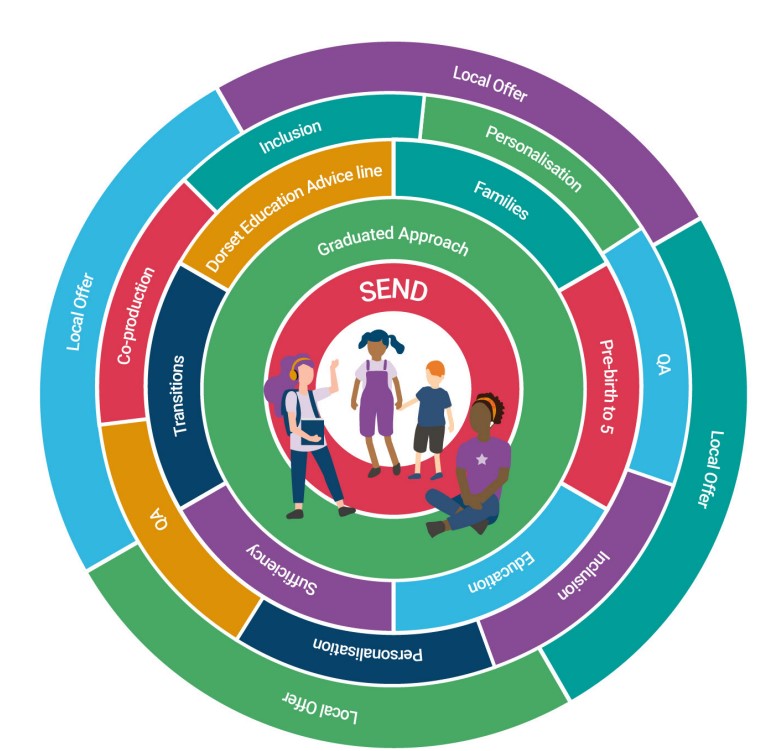Our impact: new partnership agreement
Key partners are working even more collaboratively to achieve the best outcomes for children and young people
We have a new Partnership Agreement (February 2022) which sets out how as key strategic partners we will work together to achieve the best outcomes for children and young people.
As a partnership, our mission is:
- to deliver the best education for all our children and young people,
- to prepare our young people for independence and adulthood, and
- for our children and young people to experience the best possible health and wellbeing
What working together means
We will deliver the best possible outcomes for children and young people. We will do this by sharing ideas and delivering change together, whilst also challenging each other on the journey towards a strong partnership that will be evidenced through action.
As equal partners, we share a mutual understanding of the complex and multi-layered challenges that each of our children, young people and their families may experience, and reflect this in the way that we work together to share the expertise that each partner brings and together unlock creative and innovative ways of undertaking these challenges as a system. Co-production is a practice that we want to become part of our way of working together in planning and implementing our services and the Local Offer.
We will celebrate our successes whilst also tackling our challenges together. As partners we each bring different and complimentary expertise. We strive to communicate with our families together in such a way that children, young people and their families can make use of our information and ensure that their voices are heard. Every family has a different journey and experience, and we will reflect that both in the way we listen, but also through our actions.
Our partnership vision will also reach professionals representing each of our organisations and together we will strive to ensure this is embodied across our partnership.
Our impact: improved SEND local offers and events
We have improved Dorset's SEND Local Offer to help families find trusted information, support and advice
The ‘local offer’ website gives children and young people with special educational needs and disabilities (SEND) and their families information to help them find the right help and support in their area. We have been updating and refreshing our website pages informed by the views of children and families. We have exciting plans and are creating a new digital family offer to provide a digital space for children and families where they can easily find help and advice when they need it.
We are designing online services that will provide a personalised experience. For example, having the option to open an individual account where you can access services 24-7 from your mobile device, such as plan progress or notifications about key dates and be able to book directly online onto activities.
The pages of the SEND Local Offer are an excellent way to tell us about services, and the Parent Carer Council have a dedicated Facebook page to provide feedback on the service.
Our Impact: Dorset Parent Carer Council (DPSS) information event
We have improved awareness of support services amongst SEND parent-carers by staging large face to face events
On 4 October 2022 parent-carers across Dorset had a chance to come together at Kingston Maurward College. The event was an opportunity to meet and talk to organisations, hear their news, and ask questions. There were over 200 parents and carers who attended and offered their feedback which will inform future support events.
"We loved it and were very moved by people’s kindness”
“Everything in one place and so much information that I knew nothing about.”
We are committed as a partnership to continually improve communication so we will be holding more events like this. We also welcome suggestions for how we can improve communication in other ways. Thank you to all of you who attended (it was great to see you) and a huge thank you to all of you who make up Dorset's Parent Carers community!
Our impact: a partnership with family action to delivery Special Educational Needs and Disability Information, Advice and Support Service (SENDIASS)
We have worked closely with expert charity partner Family Action to successfully deliver SENDIASS services
From February 2022, Dorset Council’s Special Educational Needs and Disability Information, Advice and Support Service (SENDIASS) has been run by Family Action, a long-established charity that supports all families.
SENDIASS aims are to:
- provide a high quality, impartial, accurate and confidential service
- empower children, young people and their parents/carers to play an informed and active part in decision-making and supporting them to make the best decisions
- contribute to partnership working with providers of education, alternative provision, training, supported employment, health and social care
- ensure service user views are heard, understood and utilised to continuously improve the service
- make sure service users understand their rights, roles and responsibilities
“We are delighted that Dorset Council has entrusted Family Action with the delivery of the Dorset SENDIAS service. We will bring expertise from our six existing SENDIAS services to offer a free, high quality, impartial and confidential service.”
Amy Brooke, Family Action’s Deputy Director for Services and Innovation, South
SENDIASS – impact facts and figs:
- launched Feb 2022
- 609 parents supported by October 2022
- 36% enquiries for EHCPs, 26% for education
- 85% enquiries successfully solved without escalation
- 70% of cases related to autism
“Thank you from the bottom of my heart for all this amazing advice. You are like a guiding light! I have actioned all the points you have suggested and I can’t thank you enough for all of them. I had no idea where to start to try and help my daughter and you have made everything so clear! So, thank you!”
Our impact: new SEND Customer Charter launches
We launched a new SEND customer charter in partnership with Dorset Parent Carer Council
At the heart of our SEND children and families customer charter is our commitment to improving the quality of life of our SEND children, young people and families. We strive to get it right first time, every time. We believe that our children and families have the right to know what level of service they can expect from us all the time - even when we fall short of the very high standards, we have set ourselves. We are committed to improving how quickly we respond to enquiries and ensure that when we do respond it is helpful and consistent wherever you live in Dorset.
We want to use feedback that people give us to get things right more often. Our staff are here to help and we know that sometimes it can be a difficult and anxious time for families. We want to ensure we can provide the right support at the right time. After the introduction of the Customer Charter in May 2022, the early indication is that we have halved the number of complaints received month on month.


